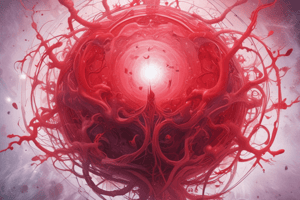Podcast
Questions and Answers
What is the function of erythrocytes?
What is the function of erythrocytes?
- Preventing infection
- Preventing blood loss
- Distributing substances like oxygen and nutrients (correct)
- Maintaining body temperature
Which of the following is a physical characteristic of blood?
Which of the following is a physical characteristic of blood?
- Clear, thin fluid with a sweet taste
- Sticky, opaque fluid with a metallic taste (correct)
- Sticky, opaque fluid with a sour taste
- Thick, transparent fluid with a metallic taste
Where do most blood cells originate?
Where do most blood cells originate?
- Heart
- Bone marrow (correct)
- Lungs
- Liver
What is the main contributor to osmotic pressure in the plasma?
What is the main contributor to osmotic pressure in the plasma?
What is the color of blood when it has high oxygen content?
What is the color of blood when it has high oxygen content?
How long do most formed elements survive in the bloodstream?
How long do most formed elements survive in the bloodstream?
What happens when the AV valves are open?
What happens when the AV valves are open?
What prevents backflow into the ventricles when they are relaxed?
What prevents backflow into the ventricles when they are relaxed?
What occurs when intraventricular pressure rises?
What occurs when intraventricular pressure rises?
What is the function of coronary circulation?
What is the function of coronary circulation?
What is the main difference between the pulmonary and systemic circuits?
What is the main difference between the pulmonary and systemic circuits?
What are anastomoses in coronary circulation primarily responsible for?
What are anastomoses in coronary circulation primarily responsible for?
Which artery supplies the interventricular septum, anterior ventricular walls, left atrium, and posterior wall of left ventricle?
Which artery supplies the interventricular septum, anterior ventricular walls, left atrium, and posterior wall of left ventricle?
What is the role of the pulmonary semilunar valve?
What is the role of the pulmonary semilunar valve?
What is an example of an ectopic focus that can lead to irregular heart rhythms?
What is an example of an ectopic focus that can lead to irregular heart rhythms?
Flashcards are hidden until you start studying
Study Notes
Erythrocytes and Blood Characteristics
- Erythrocytes, or red blood cells, primarily function to transport oxygen from the lungs to body tissues and return carbon dioxide from tissues to the lungs.
- Blood is characterized by its viscosity, pH level, temperature, and color, reflecting its oxygen content.
- Most blood cells originate in the bone marrow from hematopoietic stem cells.
Plasma and Blood Color
- The main contributor to osmotic pressure in plasma is albumin, a protein that regulates fluid balance in blood.
- Blood appears bright red when it has a high oxygen content due to the binding of oxygen to hemoglobin.
Lifespan of Blood Components and Heart Valve Function
- Most formed elements, such as erythrocytes and leukocytes, typically survive in the bloodstream for days to several months, depending on the type.
- When the atrioventricular (AV) valves are open, blood flows freely from the atria to the ventricles.
Heart Function and Pressures
- Papillary muscles and chordae tendineae prevent backflow into the ventricles when they are relaxed, ensuring one-way blood flow.
- An increase in intraventricular pressure signals the closing of the AV valves and the opening of the semilunar valves, allowing blood to exit the heart.
Coronary Circulation and Circuits
- Coronary circulation is responsible for supplying blood to the heart muscle itself, providing oxygen and nutrients critical for muscular function.
- The main difference between the pulmonary and systemic circuits is that the pulmonary circuit carries deoxygenated blood to the lungs, while the systemic circuit delivers oxygenated blood to the rest of the body.
Anastomoses and Arterial Supply
- Anastomoses in coronary circulation are mainly responsible for providing alternative pathways for blood flow to ensure adequate perfusion even if one route is blocked.
- The left anterior descending artery supplies the interventricular septum, anterior ventricular walls, left atrium, and posterior wall of the left ventricle.
Heart Valves and Arrhythmias
- The pulmonary semilunar valve prevents backflow into the right ventricle after deoxygenated blood exits to the pulmonary artery.
- An ectopic focus, such as an area of tissue in the atria, can trigger irregular heart rhythms by generating electrical impulses independently of the sinoatrial node.
Studying That Suits You
Use AI to generate personalized quizzes and flashcards to suit your learning preferences.




